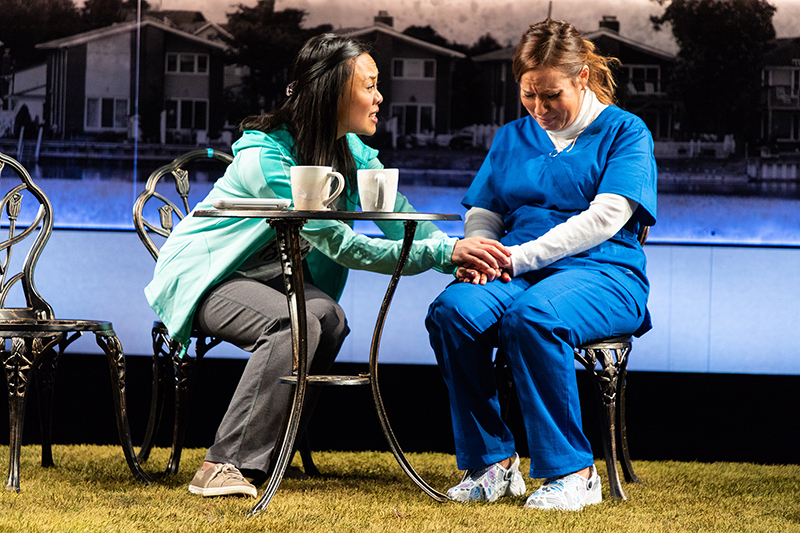If you’re not a millionaire, not married to one or don’t have a trust fund, motherhood could be daunting, if not at times overcoming the seemingly impossible. One just has to look at at the skyrocketing costs of raising a child in today’s world (read: the United States) to know this. But if you’re wealthy and like rubbing it in other parents’ faces, this review isn’t for you.
Putting costs aside, the psychic load of becoming a parent is also nothing to laugh about, but that’s what Molly Smith Metzler’s “Cry it Out” does, albeit with a caustic sense of humor. Directed by Joanie Schultz, the production is playing at Washington DC’s Studio Theatre through December 16, 2018.
Ahmad Coo is a producer and copy editor for the Global Business show on CGTN America. His analysis represents his views alone.
“Cry it Out” revolves around Jessie and Lina (played by Emjoy Gavino and Dina Thomas) who are both new mothers living in the gentrifying Long Island neighborhood of Port Washington, New York. They’re from opposite sides of the American dream: Jessie is a high-powered lawyer who’s on maternity leave and Lina is a struggling lower middle class nurse who’s living with her mother-in-law out of necessity as she dreads the return back to work.
They’re an odd couple from opposite sides of a growing wealth gap in the U.S.- their friendship growing out of the shared experience of raising a child. Lina is Long Island through and through- her accent is a dead give-away of her socio-economic background. If it weren’t for Jessie’s cabin fever and desperation for human contact other than her newborn, they would have never become friends.
Contrary to what television or Hollywood would have you believe, having a child is probably one of the most stressful life-changing events one can experience. Almost everyone I know, except maybe for some friends who can afford live-in nannies or nurse maids, have their lives turned inside out. As Studio Theatre’s artistic director David Muse would write in “Cry It Out’s” playbill, “it’s a moment that scrambles, and reorients almost everything: identity, career, marriage, money and self-worth.”
Though Jessie and Lina are at nearly opposite sides of the socio-economic spectrum, they’re both struggling to find a balance between nurturing a family and pursuing a career. Lina has less of a choice in the matter because she has to work to provide a roof over her head, though she would rather be at home raising her child. Jessie has more leeway, since her husband is wealthy and she’s saved enough to be comfortably well-off.

Emjoy Gavino and Dina Thomas in Cry It Out. Photo: Daniel Corey.
Jessie wants to become a stay-home mom and to focus on raising her newborn, but her husband wants her to go back to her high-paying lawyer job to keep their family’s dual-income status with the goal of buying a vacation home and maintaining their high-flying lifestyle. Jessie could care less about her husband’s desires.
But Jessie probably represents the dilemmas facing many women who have established careers. The phrase one usually hears describing successful women is “having it all”- meaning having the career, the family, the kids, and body.
Nevermind the sleepless nights, the potential for postpartum depression, the juggling of schedules and baby tantrums: a woman who can persevere in the face of that and then go back to her six figure job with a smile on her face is perceived to “have it all.”
It’s a phrase that’s admired in predominantly patriarchal societies, where the woman is expected to absorb most of the burden of raising children, acting as the glue to keep the family together, providing sex and affection for her husband as well as keeping the high-powered job. One can’t imagine having these standards apply to men, who are praised as ideal fathers for token tasks like changing diapers every once in a while.
This comes as the number of American adults who are getting married have decreased in recent years, according to Pew Research. Whether people are married or not are also linked to socio-economic status more than ever before, according to Pew.

Dina Thomas and Emjoy Gavino in Cry It Out. Photo: Daniel Corey.
More American women are choosing to be single, not because they’re selfish but mostly because most of the burden of raising and keeping a family together falls on them. Moreover, the U.S. is the only country in the developed world that doesn’t require employers to offer paid leave for first time mothers.
Those grim numbers and facts seem to pointing to a further breakdown of America’s societal fabric to which “Cry It Out” pokes fun at briefly. Not surprisingly, Jesse and Lina eventually make choices that are more in line with the values of the society they live in.
But instead of keeping a fatalistic gallows humor approach to dealing with the impossible choices most women have to make in starting a family, Metzler takes a more positive approach. She focuses on the bond of love between a mother and a child- which “Cry It Out’s” main protagonists Jesse and Lina show with utmost sincerity, sacrifice and fearlessness.
 CGTN America
CGTN America
 (L-R) Dina Thomas (as Lina) and Emjoy Gavino (as Jessie) in Cry It Out. Photo: Daniel Corey.
(L-R) Dina Thomas (as Lina) and Emjoy Gavino (as Jessie) in Cry It Out. Photo: Daniel Corey.

